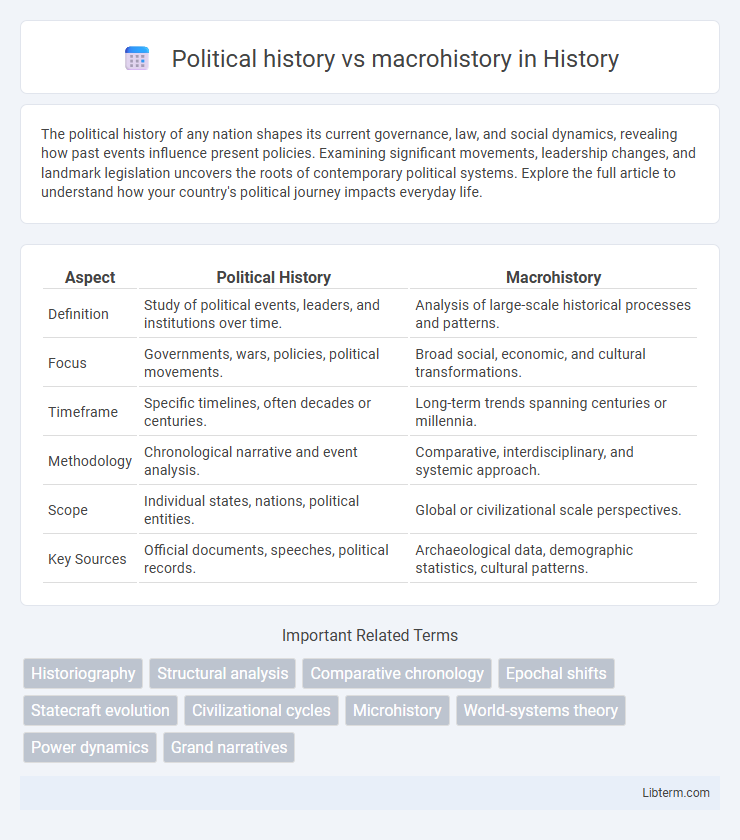The political history of any nation shapes its current governance, law, and social dynamics, revealing how past events influence present policies. Examining significant movements, leadership changes, and landmark legislation uncovers the roots of contemporary political systems. Explore the full article to understand how your country's political journey impacts everyday life.
Table of Comparison
| Aspect | Political History | Macrohistory |
|---|---|---|
| Definition | Study of political events, leaders, and institutions over time. | Analysis of large-scale historical processes and patterns. |
| Focus | Governments, wars, policies, political movements. | Broad social, economic, and cultural transformations. |
| Timeframe | Specific timelines, often decades or centuries. | Long-term trends spanning centuries or millennia. |
| Methodology | Chronological narrative and event analysis. | Comparative, interdisciplinary, and systemic approach. |
| Scope | Individual states, nations, political entities. | Global or civilizational scale perspectives. |
| Key Sources | Official documents, speeches, political records. | Archaeological data, demographic statistics, cultural patterns. |
Defining Political History and Macrohistory
Political history examines the development of political systems, institutions, leaders, and ideologies within specific states or regions, emphasizing events such as elections, wars, and policy changes. Macrohistory studies broad patterns and long-term processes across civilizations, analyzing large-scale social, economic, and cultural transformations over centuries or millennia. Defining political history centers on concrete, event-driven political actions, while macrohistory focuses on systemic, structural changes and comparative historical dynamics.
Core Concepts in Political History
Political history centers on the analysis of governance structures, power dynamics, and state formation processes within specific societies or time periods, emphasizing events like revolutions, elections, and policy shifts. Core concepts include sovereignty, legitimacy, authority, and political institutions, which shape how power is acquired, maintained, and contested. Macroehistory, by contrast, studies broad patterns and long-term developments across civilizations, linking political events to economic, social, and cultural transformations on a global scale.
Foundational Themes of Macrohistory
Political history focuses on detailed narratives of governments, leaders, and events, while macrohistory examines broad patterns and cycles across civilizations. Foundational themes of macrohistory include analyzing long-term social, economic, and cultural dynamics that shape human development over centuries. This approach prioritizes systemic forces like technological innovation, demographic shifts, and environmental changes as key drivers in historical processes.
Methodological Differences
Political history centers on analyzing specific events, leaders, and institutions, employing primary sources such as official documents and speeches to construct detailed narratives. Macrohistory adopts a broader approach by examining long-term social, economic, and cultural patterns using interdisciplinary methods like quantitative data analysis and comparative studies. The methodological difference lies in political history's focus on precise chronology and individual agency versus macrohistory's emphasis on large-scale structural forces and trends over extended periods.
Temporal Perspectives: Short-term vs Long-term Analysis
Political history emphasizes short-term analysis by focusing on specific events, leaders, and policy changes within defined periods, highlighting immediate causes and effects. Macrohistory offers a long-term perspective, examining broad patterns and structural transformations over centuries to understand processes that shape societies and civilizations. Integrating both approaches provides a comprehensive understanding of how transient political dynamics interact with enduring historical trends.
Influential Figures in Each Field
Political history centers on influential figures such as Winston Churchill, whose leadership shaped World War II outcomes, and Abraham Lincoln, known for guiding the United States through the Civil War and abolishing slavery. Macrohistory emphasizes thinkers like Fernand Braudel, who introduced long-term historical structures and cycles, and Immanuel Wallerstein, known for world-systems theory analyzing large-scale social changes. Each field's key figures contribute distinct methodologies and perspectives, with political history focusing on individual agency and macrohistory on broad systemic forces.
Case Studies: Political Events vs Macrohistorical Trends
Case studies of political events, such as revolutions, elections, and regime changes, provide detailed insights into the mechanisms and impacts of specific moments in history. Macrohistorical trends analyze broader patterns like the rise and fall of empires, economic cycles, and long-term social transformations, offering a wide-angle perspective on historical development. Combining political event analysis with macrohistorical trends enriches understanding by linking micro-level actions to overarching historical processes.
Intersections and Overlaps
Political history and macrohistory intersect in their examination of large-scale societal transformations driven by political structures, leadership, and power dynamics. Both fields analyze events like revolutions, state formation, and empire expansions to understand broader historical patterns and systemic changes over time. Overlaps emerge as political decisions often act as catalysts within macrohistorical narratives, linking micro-level political actions to macro-level social, economic, and cultural evolutions.
Critiques and Limitations
Political history often faces critiques for its narrow focus on leaders, events, and institutions, which can overlook broader social, economic, and cultural dynamics shaping historical change. Macrohistory, by aiming to identify large-scale patterns and long-term processes, encounters limitations in handling detailed, context-specific political nuances and complex regional variations. Both approaches risk oversimplification: political history may ignore structural forces, while macrohistory can underrepresent individual agency and immediate political conflicts.
Significance in Contemporary Scholarship
Political history centers on the detailed study of power structures, governance, and statecraft, providing insights into the evolution of political institutions and ideologies. Macrohistory analyzes large-scale historical patterns and processes, emphasizing long-term trends and systemic changes across civilizations and societies. Contemporary scholarship values political history for its granular focus on agency and decision-making, while macrohistory offers a broader analytical framework that contextualizes political events within global and temporal dynamics.
Political history Infographic

 libterm.com
libterm.com